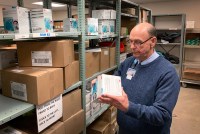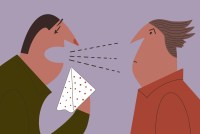Latest KFF Health News Stories
Lo que los padres deben saber sobre la difícil decisión de cerrar escuelas
Los cierres son parte de una estrategia amplia para limitar las interacciones públicas y frenar la propagación de COVID-19. Pero la decisión está lejos de ser fácil, y es controversial.
Many Schools Have Closed ― But Not All. What Parents Need To Know About That Tough Call.
Closing K-12 schools is part of a broad strategy to limit public interactions and slow the spread of COVID-19 cases. But the decision is far from easy, with conflicting science about how effective such closures are weighed against the massive disruption to families’ lives.
Ships, Planes, Trains, Scooters All Need A Virus Wipe. But What Does A ‘Deep Clean’ Mean?
There is no universal protocol for a “deep clean” in trying to eradicate the novel coronavirus. Industries are tailoring sanitation efforts in accordance with what makes sense for them.
Estos científicos crearon rápido una prueba eficaz mientras el coronavirus se acercaba
Los doctores Keith Jerome y Alex Greninger, de la Universidad de Washington, han supervisado la implementación de más de 4,000 pruebas de pacientes de todo el país.
How Intrepid Lab Sleuths Ramped Up Tests As Coronavirus Closed In
Drs. Keith Jerome and Alex Greninger fast-tracked a test for the deadly new coronavirus weeks before it began spreading in the U.S. Their work has been key to detecting community transmission and ramping up the nation’s testing capacity.
Looking For Answers After Coronavirus Contact? Welcome To The Gray Zone
The COVID-19 outbreak has spawned confusion among health officials, doctors and the public, especially for people who fall into the gray area for testing and deciding whether they need to quarantine themselves. Where to turn for answers about isolation and quarantine varies by locale. All this means agencies are sometimes delaying needed advice and giving people incorrect information.
Coronavirus Pushes Hospitals To Share Information About Stocks Of Protective Gear
There is currently no central coordination of the supply of protective garb and masks in U.S. hospital inventories. A CDC project wants hospitals to share that information for the good of all.
¿Cómo evitar el coronavirus? Lecciones de personas cuyas vidas dependen de ello
Personas que recibieron trasplantes de órganos, que están en quimioterapia o viven con enfermedades crónicas, conocen bien las normas de higiene que ahora se promueven.
How To Avoid Coronavirus? Lessons From People Whose Lives Depend On It
As the new coronavirus continues its spread through the U.S., the general public can look for guidance from millions of Americans with weakened immune systems who long ago adopted the rules of infection control that officials tout to avoid contagion.
As Youth Suicides Climb, Anguished Parents Begin To Speak Out
The suicide rate for children ages 10 to 14 almost tripled in a decade and is still rising. As parents grapple with loss, some turn to activism.
Must-Reads Of The Week From Brianna Labuskes
Newsletter editor Brianna Labuskes wades through hundreds of health care policy stories each week, so you don’t have to.
In An Exchange About Coronavirus, Homeland Security Chief Gets Flu Mortality Rate Wrong
The Homeland Security secretary missed the mark with his estimate of the flu’s annual U.S. mortality rate.
Nursing Home Outbreak Spotlights Coronavirus Risk In Elder Care Facilities
The spread of coronavirus disease to a skilled nursing facility in Washington state underscores the risk the deadly new virus poses in elder care facilities, where illnesses caused by more common pathogens, like seasonal influenza, often spread rapidly.
Brote de coronavirus en Washington revela riesgo en los centros de adultos mayores
En los Estados Unidos, 2.2 millones de personas viven en entornos de atención a largo plazo y pueden estar en mayor riesgo debido a la edad y a condiciones de salud subyacentes.
Must-Reads Of The Week From Brianna Labuskes
Newsletter editor Brianna Labuskes wades through hundreds of health care policy stories each week, so you don’t have to.
Growing Concerns Of Coronavirus Should Spur Plans – Not Panic – In The Workplace
Even in the event of an outbreak, employers have to follow certain rules in their efforts to protect employees from this virus.
New California Coronavirus Case Reveals Problems with U.S. Testing Protocols
Disease experts say a new coronavirus case in California underscores the need for more widespread community testing for the illness, as well as problems caused by the delays in getting functional coronavirus test kits to state and local public health agencies.
Must-Reads Of The Week From Brianna Labuskes
Newsletter editor Brianna Labuskes wades through hundreds of health care policy stories each week, so you don’t have to.
When It Comes To The New Coronavirus, Just Who Is A ‘Close Contact’?
Health officials stress that the new coronavirus devastating mainland China continues to pose minimal risk in the United States. The exception involves people who have had “close contact” with someone infected with the virus. So what exactly is close contact?
Con el nuevo coronavirus, ¿quién es un “contacto cercano”?
La forma en que se propaga un virus y la gravedad de la enfermedad que causa determina la forma en que los oficiales de salud deciden cuántas personas corren riesgo de contagio.



















